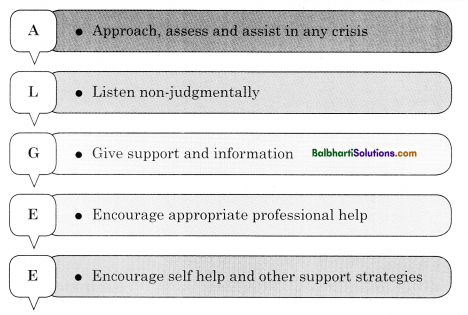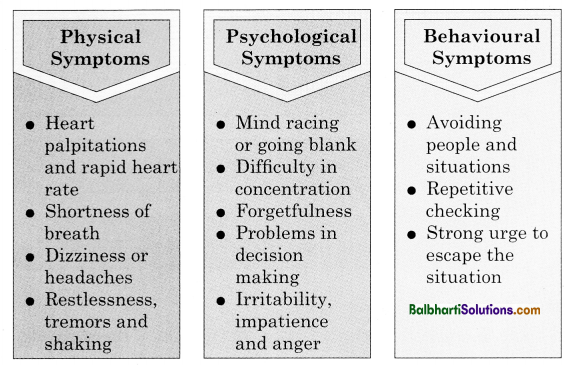By going through these Maharashtra State Board Class 12 Psychology Notes Chapter 7 First Aid in Mental Health students can recall all the concepts quickly.
Maharashtra State Board Class 12 Psychology Notes Chapter 7 First Aid in Mental Health
Introduction:
According to a study conducted by NIMHANS (2014-2016), nearly 10% of the population suffers from common mental disorders. Stressors such as work or academic pressures, lack of social support can contribute to poor mental health.
The main hurdles in receiving treatment for poor mental health are –
- Lack of awareness
- stigma attached to mental illness
- high cost of treatment
- reliance on non-medical explanations for mental illness, for e.g., evil spirits,
- shortage of trained mental health professionals.
Mental Health First Aid (MHFA) is an internationally recognized training programme designed to teach people how to identify the signs and symptoms of mental health and to provide assistance on a first aid basis. MHFA was originally developed by Betty Kitchener and Anthony Jorm.
First Aid in Mental Health is a concept based on the idea of “prevention is better than cure. If the early signs of mental illness are recognized, it can help in the following ways.
- Diagnosis – timely diagnosis at the onset of mental illness helps to prevent it from developing into a more severe form.
- Intervention – early intervention helps to get professional help.
- Relapse prevention – it can prevent reoccurrence of symptoms of the mental illness.
![]()
Algee – Action Plan:

Approach, assess and assist in any crisis: An attempt is made to understand the situation and observe if there are behavioural changes in the person whom we are concerned about.
Listen non-judgmentally: We should listen to the other person without letting our opinions influence us. We should not judge/ criticise but listen with acceptance and empathy. It does not imply that we agree with what the other person is saying but it ensures that the person feels supported.
Give support and information: This helps the person to feel more in control of the situation since they have emotional and informational support.
Encourage the person to get professional help: Persons suffering from mental illness may hesitate to seek help due to lack of knowledge or due to stigma attached. Others may not know how to respond to someone showing ‘red flags’ of mental illness and may do more harm than good. Mental health professionals are trained to help the person to identify the problem and cope with the situation.
Encourage self-help and other support strategies: Self-help strategies are tasks that help to increase our resources to deal with stress and to maintain mental health such as exercise, rest, and sleep, proper diet, having hobbies, etc.
First Aid In Depression:
Individuals who experience depression, commonly have a negative thinking style and feel worthless and helpless.
A number of changes are noticed in their behaviour such as
- complaining of feeling tired or sleepy all the time
- avoiding family and friends and spending much time alone
- remaining sad and forgetful
- bunking class or performing poorR7 in exams and having difficulty in concentrating.
![]()
First Aid In Anxiety:
If anxiety is excessive or persists after the anxiety creating situation has subsided, it can lead to anxiety disorders such as phobias, acute stress disorder, etc.
The factors contributing to anxiety are genetic factors; imbalance of certain neurotransmitters, traumatic events, etc.
Symptoms shown in anxiety –

Behavioural Addictions:
Behavioural addictions refers to the need to engage in an activity or behaviour repeatedly, even though it has a negative impact on one’s physical and mental health. For e.g. shopping addiction, gambling addiction, internet addiction, etc.
Internet and Social media usage: The amount of time spent on using internet as well as the purpose of its usage is significant. Over-dependence on the internet and social media can lead to problems in life. The four C’s are indicators of excessive usage of internet – Craving, Control, Compulsion, Consequence.
The Red Flags that indicate over-dependence on internet are-
- Feelings of euphoria while using the internet.
- Physical symptoms like headache, dry eyes, etc.
- Inability to keep to schedules and boredom with routine tasks.
- Neglect of personal hygiene and nutrition just to remain online.
NIMHANS (Bengaluru) has begun the Service for Healthy Use of Technology (SHUT) to deal exclusively with mental health issues that are technology-related.
Providing First Aid in mental health issues is a bridge between the person and the mental health professional.
![]()
Glossary:
→ Mental Health – It is a state of mind that is characterised by emotional well-being, good adjustment and ability to cope with the demands and stresses of daily living.
→ Mental well-being – It is a feeling of wellness in which an individual realises his or her own potential, can cope with stressful situations and can make productive contributions to the society to live a meaningful life
→ Sleep hygiene – Techniques and routines that can he followed to improve sleep patterns.
→ Stigma – A negative social attitude which is associated with individuals diagnosed with a mental disorder and often leads to social disapproval, discrimination and exclusion of that individual in society.
→ Procrastination – Is the avoidance of completing a task that needs to be completed.